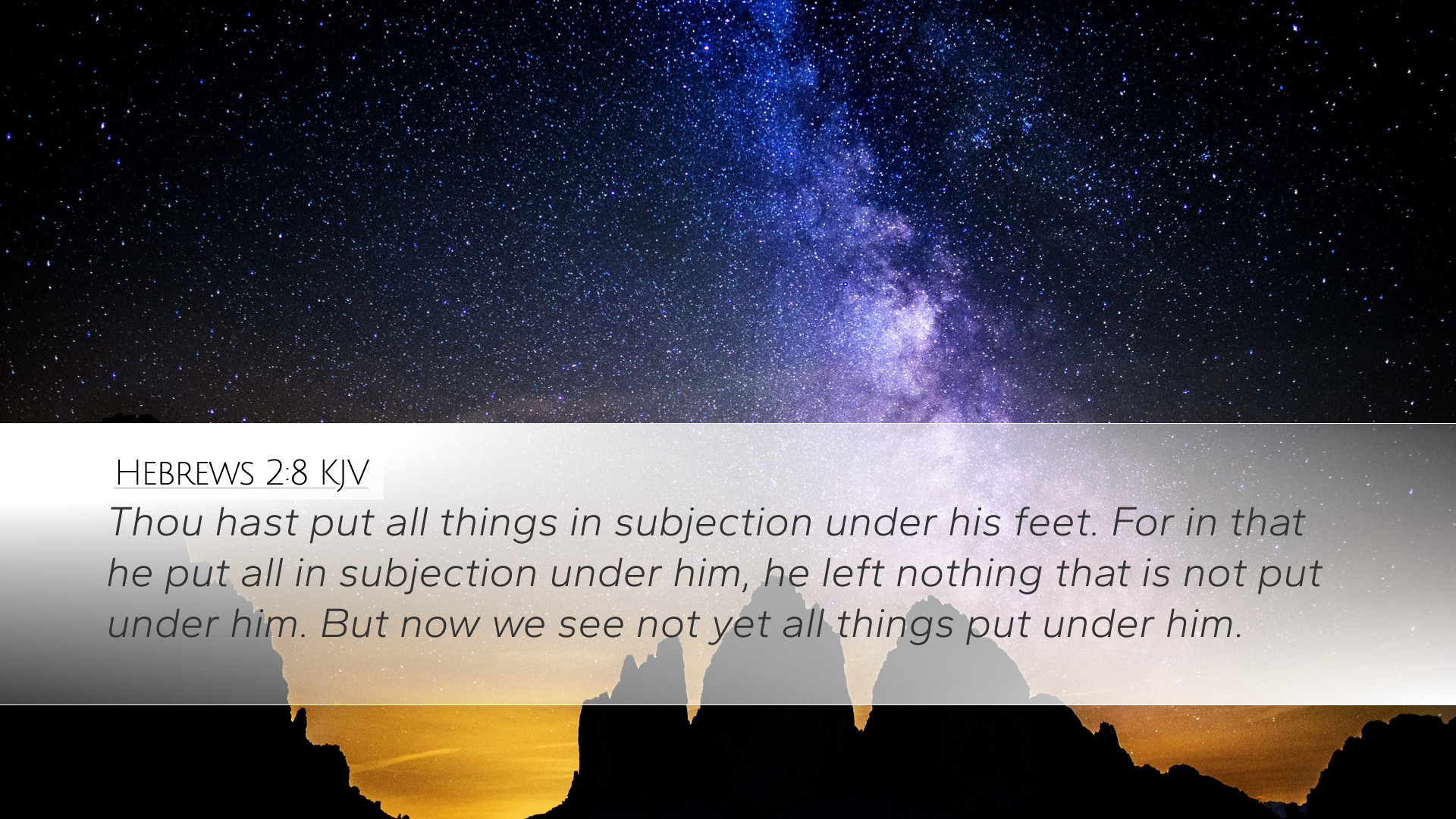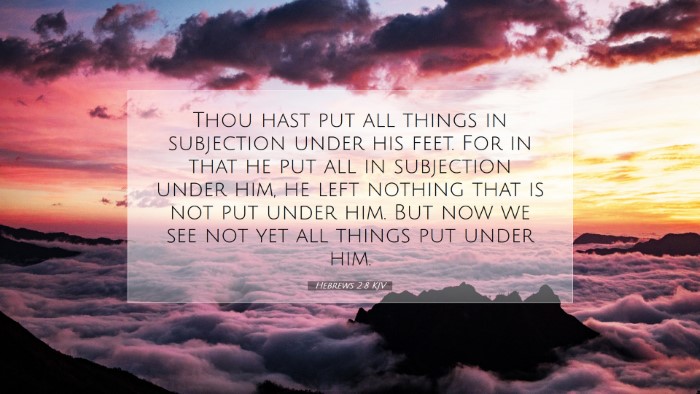Old Testament
Genesis Exodus Leviticus Numbers Deuteronomy Joshua Judges Ruth 1 Samuel 2 Samuel 1 Kings 2 Kings 1 Chronicles 2 Chronicles Ezra Nehemiah Esther Job Psalms Proverbs Ecclesiastes Song of Solomon Isaiah Jeremiah Lamentations Ezekiel Daniel Hosea Joel Amos Obadiah Jonah Micah Nahum Habakkuk Zephaniah Haggai Zechariah MalachiHebrews 2:8
Hebrews 2:8 KJV
Thou hast put all things in subjection under his feet. For in that he put all in subjection under him, he left nothing that is not put under him. But now we see not yet all things put under him.
Hebrews 2:8 Bible Commentary
Commentary on Hebrews 2:8
Verse: "You have put all things in subjection under his feet." For in that he put all in subjection under him, he left nothing that is not put under him. But now we do not yet see all things put under him.
Introduction
The passage in Hebrews 2:8 draws attention to the exalted position of Christ in relation to creation. The author quotes Psalm 8:6, emphasizing the dominion granted to humanity and particularly fulfilled in the person of Jesus Christ. This commentary seeks to elucidate the theological implications of this verse, integrating insights from public domain commentaries for a comprehensive understanding.
Exegesis and Analysis
Hebrews 2:8 delves into several crucial theological themes:
- Subjection of All Things: The phrase "put all things in subjection" signifies God's sovereign arrangement over creation. Matthew Henry emphasizes that the term suggests authority and dominion that was originally bestowed upon humanity and now ultimately fulfilled in Christ.
- Christ’s Humanity: The linkage between humanity's original role and Christ's incarnation showcases the redemptive plan. Albert Barnes notes that while humans fell short of their created purpose, Christ, as the perfect man, restored that authority, reflecting God’s intention.
- Present Reality vs. Future Fulfillment: The latter part of the verse highlights the tension between the declaration of Christ’s dominion and the observable reality. Adam Clarke points out that although Christians affirm Christ’s reign, the full realization of His sovereignty is yet to be displayed in the world, pointing toward eschatological hope.
Theological Implications
The implications of Hebrews 2:8 are profound, inviting deeper reflection on the following aspects:
- Understanding Christ’s Role: The supremacy of Christ as the one who fulfills the psalmist's declaration is pivotal. Matthew Henry argues that recognizing Christ in this role galvanizes faith, reinforcing believers’ confidence in His ultimate authority over all life and creation.
- Human Dignity and Purpose: The subjection under Christ reinstates the inherent value and purpose of humanity. It serves as a reminder of the original intent of God’s creation, allowing believers to reflect on their roles and responsibilities in the world.
- Hope in Unfulfilled Promises: The tension of “we do not see yet” reminds Christians to maintain hope amid incompleteness. Albert Barnes illustrates this by encouraging believers to engage actively in the world while awaiting the culmination of God’s kingdom.
Pastoral Applications
This passage challenges pastors to convey the depth and breadth of Christ’s authority and His blueprint for humanity. Here are several applications:
- Preaching on Christ’s Lordship: Pastors are encouraged to proclaim the lordship of Christ, using this text to remind congregants of His present sovereignty and future rule, generating hope and reliance on Christ amidst life's trials and uncertainties.
- Encouraging Kingdom Work: Church leaders can motivate congregants to engage in service and justice-oriented actions, knowing that they are fulfilling a divine mandate underscored by the reality of Christ’s ultimate authority.
- Fostering Community Hope: In a world marked by disorder and challenge, pastors have the unique opportunity to instill hope by reminding the church of the "not yet" aspect of God’s kingdom, encouraging patience and faithfulness in witnessing and serving.
Conclusion
Hebrews 2:8 invites believers into a profound understanding of Christ’s exalted role as the one who governs creation while also highlighting the need for patience as they await the full realization of His reign. Insights from the likes of Matthew Henry, Albert Barnes, and Adam Clarke provide a rich tapestry of thoughts that resonate with theologians, scholars, and students alike, fostering a deeper appreciation of the interwoven themes of authority, hope, and purpose in Christ.


